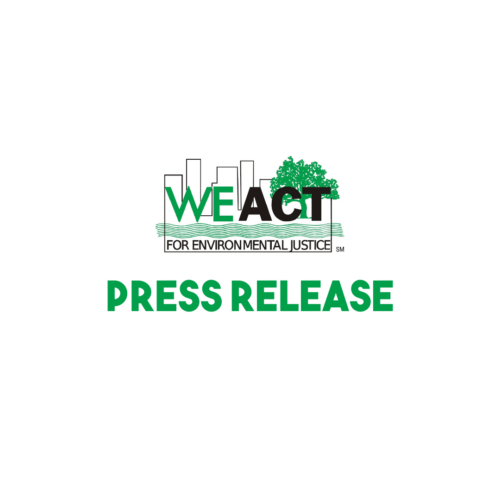FOR IMMEDIATE RELEASE
May 8, 2025
Contact: Ashley Sullivan
Ashley.Sullivan@weact.org
1(917) 837-1183
For Air Quality Awareness Week, WE ACT for Environmental Justice and advocates from across the U.S. launch a new campaign with a webinar and polling results showing need to ensure the right to healthy homes for environmental justice communities
WASHINGTON — For Air Quality Awareness Week, WE ACT for Environmental Justice and partners launched ‘Healthy Homes First,’ a new national campaign amplifying lived experiences, driving policy reforms, and whole-of-home changes to advance clean, affordable energy upgrades, and remedy health hazards like indoor air pollution. On Wednesday, May 7th, WE ACT hosted a webinar featuring insights from experts, strategic partners including Action in Montgomery, and findings from exclusive polling – in collaboration with Embold Research – on public attitudes and awareness regarding energy upgrades, home health hazard remediation, and more. Some of these findings include that despite 61% of people of color being most concerned about indoor health hazards like air pollution from fossil fuel appliances, these groups are the least likely to have electric appliances. See our full results here.
Low-income households and people of color in public and affordable housing face the worst indoor health hazards and extreme weather, all while struggling to access clean, affordable energy. With the future of energy efficiency incentives uncertain, critical federal agency staff cuts including cooling relief programs affecting millions, real-time impacts of the climate crisis growing, and environmental protections at risk, prioritizing healthy homes is urgent.
“Everyone, regardless of race or income, is entitled to a healthy home. Affordable and public housing residents, who are disproportionately Black and Latinx, experience higher rates of asthma, exacerbated by pollutants from fossil fuel appliances and other health hazards including mold and lead. We must work to reduce health disparities and support vulnerable communities by making sure housing weatherization and electrification is done together with comprehensive upgrades, alongside lead, mold, and pest remediation, so that our communities can experience well-being in and out of the home.” – Leslie Fields, Chief Federal Officer, WE ACT for Environmental Justice
Environmental justice communities — communities of color and low-income communities that experience adverse human health and/or environmental effects due to systemic prejudicial policies and underinvestment – live with multiple sources of pollution and health harms in addition to dangerous housing conditions and deferred maintenance. This, on top of deadly extreme heat caused by the climate crisis and increasingly high energy bills, make lead exposure, asthma triggers like mold and pests, and indoor air pollution from fossil fuel appliances like gas stoves, even worse.
WE ACT’s first of its kind report, “Out of Gas, In with Justice” showed that public housing residents were exposed to 190% higher average NO2 concentrations in kitchens with gas stoves than those with induction stoves. In DC and Maryland, of 700 kitchens two-thirds tested positive for unsafe levels of NO2. NO2 is a pollutant known to cause asthma and other cardiopulmonary effects as well as premature death. Additionally, WE ACT’s National Building Pollution Report showed that U.S. buildings account for about 40% of total energy consumption and 9% of direct greenhouse gas (GHG) pollution.
As indoor health risks grow and contribute to the climate crisis, WE ACT and our partners have been advocating to protect and improve programs that make housing healthier, safer, and more affordable, including the Low Income Home Energy Assistance Program (LIHEAP). However, this popular program – our polling results show over 74% of bi-partisan national voters and almost 90% of low-income people of color in support – is facing an existential threat as the Trump administration fired the entire program staff at Health and Human Services (HHS). With extreme heat being the deadliest impact of the climate crisis, and mortality rates from heat being much higher in low-income communities and communities of color, removing LIHEAP staff puts 6.2 million people at risk nationwide. A recent report by WE ACT and NRDC underscores that LIHEAP needs much more, not less, support and funding.
WE ACT defines a healthy home as one that not only avoids health and safety threats in the built environment, but also promotes mental, social, and environmental well-being. Living every day in an unhealthy indoor environment is a violation of basic rights, and environmental justice communities deserve to benefit from the transition to a clean energy future. At this critical time, our campaign will build off of our advocacy in 2024 and legacy of work in New York, to ensure coordinated effort, programs, and funding to achieve healthier housing for all.
To learn more and participate in the campaign, visit healthyhomesfirst.org and contact ashley.sullivan@weact.org. See Embold methodology statement on polling here.
# # #
WE ACT for Environmental Justice is a Northern Manhattan membership-based organization whose mission is to build healthy communities by ensuring that people of color and/or low-income residents participate meaningfully in the creation of sound and fair environmental health and protection policies and practices. WE ACT has offices in New York and Washington, D.C. Visit us at weact.org and follow us on Facebook, Bluesky, and Instagram.
